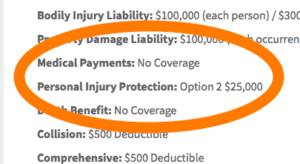If you’re looking for an answer to the question “Can a passenger sue a driver after an accident?,” there are a a two things you should know right away.
One: know that every accident* is a little different, and the circumstances of your situation may change the answer to this question.
Two: Yes. The law is complicated, and it’s not unusual for a passenger to have to sue the person who was at the wheel of the car in which they were riding at the time of the crash.**
It is important to remember that a driver’s personal assets are usually not at risk. It is very rare that a driver’s personal assets are at stake in a personal injury lawsuit. This is why people have car insurance.
When can a passenger sue a driver who caused a crash?
We are regularly asked this question by potential new clients calling for a free consultation. Here are some of the circumstances we commonly see.

A one-car crash
The most common reason we see is a one-car crash. In most years, around 60% of fatal car crashes in the U.S. involved only one vehicle. About 50% of fatalities are drivers; 17% are passengers.
Since it’s a single-car crash, as the passenger, you may need to file a claim against the driver’s insurance company to pay your medical bills, and expenses and for the pain and suffering that you have incurred and may incur in the future. If they refuse to cover your damages or attempt to minimize your damages, then these would be situations in which a passenger may sue the driver.
For example: A driver took a corner too fast and crashed into a guardrail, causing serious injuries to the passenger. The passenger may need to file an insurance claim for damages against the driver and ultimately may need to file a lawsuit.
Your driver is at fault
A passenger may also have to file a claim against the driver of the car they are riding in, if:
- the driver was responsible for causing a collision with another vehicle;
- if it’s not clear who is at fault; or,
- if both drivers share some responsibility for the damage.
In these situations, you or your lawyer may need to file insurance claims against both drivers.
If the insurance company adjusters can’t agree on who is at fault, or won’t pay for your medical bills and damages, then you may have to file a lawsuit against either or both drivers.
Case Example: Our client, a college student, was a passenger in a friend’s car when the driver of the vehicle ran a red light and collided with a semi-truck. Our client had a closed head injury, broken bones, and a severed appendage. Our client had to file a lawsuit against the friend who had caused the crash; the case was settled out of court.
The other driver is uninsured
UM/UIM is a specific type of insurance that pays damages and injuries if the driver who caused the collision:
- does not have current car insurance (UM = “Uninsured Motorist”); or,
- does not have enough insurance to pay for all of the damage (UIM = “Under-insured Motorist”).
For example: You’re riding in a van that gets rear-ended while merging onto I-5. The driver and owner of the vehicle do not have car insurance. You may need to file an injury claim against the van driver’s UM/UIM insurance. (In addition, your own UM/UIM insurance will provide secondary coverage.)
These are just a few of the circumstances we have seen; there are many other possibilities. Contact us with questions, or for a free consultation.
For more information:
A quick guide to car insurance in Washington State
How to report a crash and start an insurance claim



